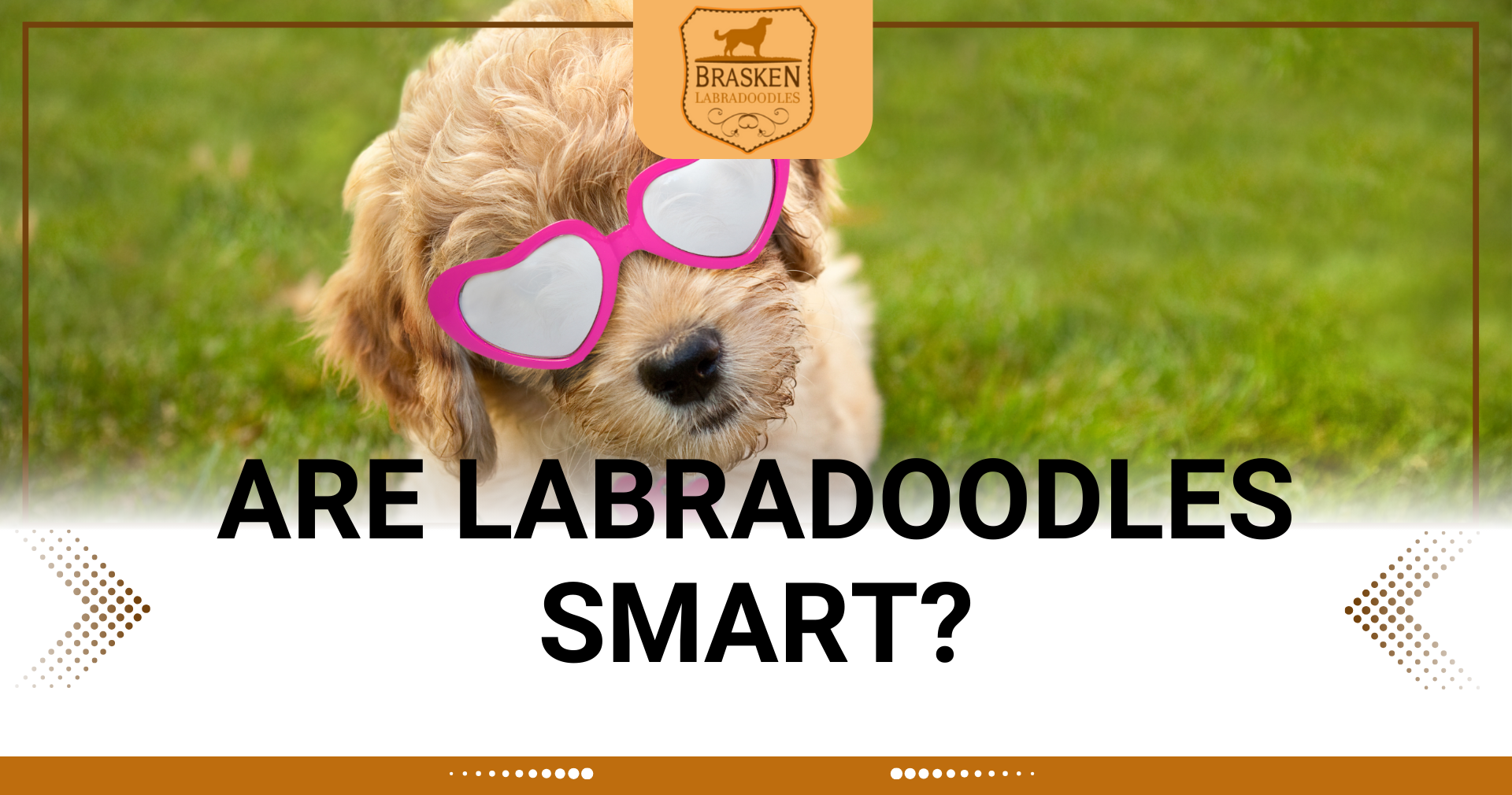Labradoodles are a crossbreed between Labrador Retrievers and Poodles, known for their friendly nature, hypoallergenic coat, and versatility in various roles, ranging from family companions to therapy and service dogs. This hybrid combines the intelligence of its parent breeds, creating a well-rounded dog companion.
Overview of Intelligence in Dogs
Dog intelligence is about how clever and understanding dogs can be. It’s like how they figure things out, follow instructions, and get along with people. Some dogs, like our labradoodles here in California, are known for being smart and easy to teach. They can learn tricks and help humans in different jobs or act as guide dog. Understanding a dog’s smarts helps us train and be friends with them better!
The Origins of Labradoodles
Before delving into the intelligence of the dog breed Labradoodles, it’s essential to understand their origins. Labradoodles didn’t just magically appear; they have an interesting story. In the 1980s, a clever breeder named Wally Conron in Australia wanted to create guide dogs for people with allergies. So, he mixed a Labrador Retriever with a Poodle, hoping to get a friendly dog, that didn’t shed much, and was good for people with allergies. And that’s how Labradoodles came to be! Labradoodle breeders in Southern California and other high population communities quickly gained popularity for its friendly nature, intelligence, and minimal shedding, making it an ideal choice for those with allergies. Additionally, the inclusion of standard labradoodle, miniature labradoodle, and American labradoodle varieties broadened the breed’s versatility and appeal.
Labradoodles, the result of breeding a golden retriever and a toy poodle, often intrigue dog owners curious about their intelligence. As a mixed breed, they blend the characteristics of their parent breeds, known for their intelligence. While Labradoodles aren’t recognized as a purebred dog, their reputation as intelligent and trainable companions has led to their popularity as service dogs. Their lineage combines the smarts of the golden retriever and the toy poodle, making them a fascinating designer dog option for prospective dog owner.
Labradoodles’ Intelligence Traits
What makes Labradoodles particularly intelligent is their ability to adapt to various roles, excelling as service dog and therapy dogs. Their intelligence is influenced by genetics, early training, and the environment they grow up in. By understanding these traits, we can appreciate the unique cognitive abilities that make Labradoodles not just adorable pets but also versatile and intelligent companions. We have listed a few prominent traits below:
Cognitive Abilities
Labradoodles are often praised for their cognitive abilities, showcasing intelligence that goes beyond simple obedience. Intelligence in dogs is multifaceted, encompassing problem-solving skills, social understanding, and adaptability. Labradoodles consistently demonstrate a high level of intelligence, making them versatile and trainable companions.
One notable aspect of their cognitive prowess is their capacity for learning and retaining commands. Labradoodles are known for being quick learners. If you teach them something, they catch on pretty fast. Whether it’s fetching a ball or learning tricks, these intelligent dog are eager to make you happy. They like when you praise them, and they remember what you teach them. Their eagerness to please their owners, combined with an inherent curiosity, contributes to their ability to grasp new concepts swiftly.
Male Labradoodle inherit the intelligence of their parent breed, making them ideal candidates for various roles. Whether serving as therapy dog providing comfort or guard dog offering protection, their versatility shines through.
Problem-Solving
Labradoodles are good at figuring things out. They can solve simple problems and find hidden toys. Being smart also means being good at solving problems. Labradoodles enjoy figuring things out. It’s not just about playing; it’s like they’re using their brains to have fun! Labradoodles, with their lineage including the highly intelligent Poodle, often display an above-average aptitude for problem-solving. This is particularly evident in their ability to navigate puzzles, retrieve objects, and understand cause-and-effect relationships.
Labradoodles excel in activities that challenge their mental faculties, such as interactive games. Their problem-solving abilities not only contribute to their intellectual stimulation but also make them engaging and entertaining companions for their human counterparts.
Adaptability
Labradoodles’ intelligence is further shown by their adaptability to various environments and tasks. Originally bred as guide dogs, Labradoodles have proven themselves in roles beyond assistance work. Labradoodles can fit into different places and situations. Their versatility allows them to thrive in diverse settings, from suburban households to urban apartments.
Their adaptability is not limited to physical environments alone but extends to social interactions as well. Labradoodles tend to be sociable, making them well-suited for families, individuals, or even as therapy animals. Their ability to read human emotions and respond appropriately adds another layer to their perceived intelligence.
Emotional Intelligence
Here is a brief explanation of the emotional intelligence of Labradoodles:
Empathy: Labradoodles can sense when someone is upset or happy. They often show empathy by comforting those in need.
Bonding: These dogs form strong bonds with their owners. They love being part of the family and are loyal companions.
Social Skills: Labradoodles are friendly and enjoy the company of people and other pets. They easily make friends and are good in social settings.
Understanding these traits helps us see how Labradoodles are not just clever problem-solvers but also emotionally connected and socially adept companions.
Factors Influencing Labradoodles’ Intelligence
Labradoodles’ intelligence is shaped by a combination of factors, beginning with their genetics. The way they are bred and the traits inherited from their Labrador and Poodle parents play a significant role. Early socialization and training are crucial influences on their intelligence, as positive experiences and learning during puppyhood set the foundation for their cognitive development. The environment in which Labradoodles are raised, including the stimuli and interactions they encounter, also contributes to their intelligence.
In essence, a Labradoodle’s smarts are a result of a combination of nature and nurture. By understanding and optimizing these factors, owners can help foster the full spectrum of intelligence in their Labradoodle companions, ensuring they thrive as clever, adaptable, and well-rounded dogs.
Tips for Enhancing Labradoodles’ Smartness
- Engage in Interactive Play: Use toys that stimulate their minds, such as puzzle feeders or toys. This encourages problem-solving and keeps them mentally active.
- Positive Reinforcement Training: Reward good behavior with treats or praise. Labradoodles respond well to positive reinforcement, making training sessions enjoyable and effective.
- Regular Exercise: Physical activity is linked to mental well-being. Ensure they get regular exercise to prevent boredom and encourage overall cognitive health.
Labradoodles undoubtedly stand out as intelligent and adaptable companions, embodying a harmonious blend of problem-solving prowess, emotional intelligence, and social skills. Their lineage, combined with positive environmental influences, contributes to their cognitive excellence. Labradoodles not only excel in tasks but also forge deep emotional connections with their owners. By engaging in interactive play, positive reinforcement, and regular exercise, owners can enhance their Labradoodles’ intelligence and ensure a fulfilling and vibrant companionship.
If you are searching for labradoodles for Sale in California, look no further. Brasken Labradoodles is an accredited Labradoodle breeder serving those in and out of the state.

